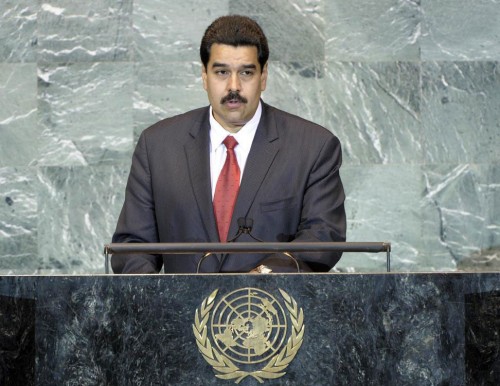
Bolivarian Republic of Venezuela Foreign Minister Nicolas Maduro Moros speaking at the United Nations General Assembly. The Latin American state condemned the US-NATO war against the North African nation of Libya., a photo by Pan-African News Wire File Photos on Flickr.
Updated January 26, 2013, 7:36 p.m. ET
Venezuela's Chavez Has Overcome Lung Infection
By KEJAL VYAS and MATTHEW COWLEY
SANTIAGO, Chile--Venezuela's cancer-stricken President Hugo Chavez has overcome a lung infection that he had faced after his latest surgery in Cuba 45 days ago, Information Minister Ernesto Villegas said Saturday.
The socialist leader hasn't been seen or heard from since his last procedure, leading to rampant speculation that the 58-year-old's ailing health may force him from office.
Mr. Villegas said that the evolution of the president's health was "favorable" but that he would continue receiving treatment on the Caribbean island, where he has received the bulk of his medical care since disclosing he had cancer in June 2011.
"President Chavez has completed one stage of his recovery, it's been 45 days," Mr. Villegas told reporters in Chile. "Now another stage starts that is designed to target the underlying illness that motivated the operation of Dec. 11."
Top Venezuelan officials are in Santiago participating in a regional summit.
Mr. Chavez was still experiencing some breathing difficulties despite beating the respiratory infection, the minister said.
The official said that Venezuelans trusted the government's information about Mr. Chavez. "When we have had to provide bad news we've done it," Mr. Villegas said. "We had to ruin the end of the year for many Venezuelan families."
He was referring to a Dec. 30 update in which the government reported that Mr. Chavez had faced "new complications" and remains in a "delicate" state as he recovered from surgery.
The official blamed critics of the government for spreading bad news about the president's health.
"Basically, [opponents are] terrified of Chavez, they're very afraid of Chavez, so they're only betting that Chavez won't return," Mr. Villegas said.
Asked about Mr. Chavez's decision to seek treatment in Cuba, Mr. Villegas said it wasn't exceptional among Venezuelans.
"The sister republic of Cuba is a health destination for millions of Venezuelans, as part of the Cuba-Venezuela agreement," Mr. Villegas said. "Thousands of families have gone to Cuba to cure themselves of their illnesses, not just the president."
Meanwhile, the official said that a spat with Spanish newspaper El Pais over the publication of a fake photograph of President Chavez supposedly in hospital isn't over, because the newspaper hasn't apologized to Mr. Chavez and his family.
"It's an arrogant attitude that speaks to a historic and systematic aversion that this newspaper expresses for the leadership of Chavez and for Latin America," Mr. Villegas said. He didn't say what steps the Venezuelan government would be taking against the newspaper.
The minister also assured that Mr. Chavez was actively taking decisions and fulfilling his role as head of state. Vice President Nicolas Maduro discussed with Mr. Chavez details of a riot in the Uribana prison in Lara state, that reportedly left more than 50 people dead, Mr. Villegas said.
Officials haven't said when the president is due back in Caracas. After winning re-election in October, the Supreme Court allowed Mr. Chavez to begin his new six-year term on Jan. 10 despite his inability to attend the ceremony in the capital.
The country's top court ruled that Mr. Chavez could be formally sworn in at a later, unspecified date.
Write to Kejal Vyas at kejal.vyas@dowjones.com and Matthew Cowley at matthew.cowley@dowjones.com
No comments:
Post a Comment